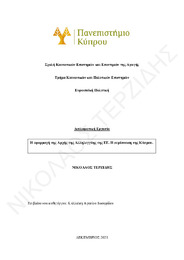Η εφαρμογή της Αρχής της Αλληλεγγύης της ΕΕ. Η περίπτωση της Κύπρου

View/
Date
2021-12Advisor
Αγαπίου-Ιωσηφίδου, ΚαλλιόπηPublisher
Πανεπιστήμιο Κύπρου, Σχολή Κοινωνικών Επιστημών και Επιστημών Αγωγής / University of Cyprus, Faculty of Social Sciences and EducationPlace of publication
ΚύπροςGoogle Scholar check
Keyword(s):
Metadata
Show full item recordAbstract
Η Ευρωπαϊκή Ένωση για τη δημιουργία της βασίστηκε σε ορισμένες αρχές οι οποίες απομάκρυναν τα ζητήματα πολέμου και επέτρεψαν την ειρήνη και την ευημερία στην περιοχή. Ανάμεσα στις βασικότερες αρχές της ήταν και αυτή της αλληλεγγύης σε όλες τις εκφάνσεις τόσο τις κοινωνικές όσο και τις πολιτικές. Στο πλαίσιο της διεύρυνσης της η Ευρωπαϊκή Ένωση δέχτηκε την Κύπρο στους κόλπους της χωρίς όμως να επιλυθεί τελικά το ζήτημα της κατοχής του νησιού. Ζήτημα γεννάται κατά πόσο η πολυθρύλητη αλληλεγγύη λειτούργησε στην προκειμένη περίπτωση ή εάν κατέστη μία ελαστική έννοια η οποία αποδεικνύει άλλη μία φορά την πολιτική αδυναμία της ευρωπαϊκής Ένωσης σε υψηλής πολιτικής ζητήματα. The European Union was founded on certain principles which removed the issues of war and allowed peace and prosperity in the region. Among its most basic principles was that of solidarity in all its manifestations, both social and political. In the context of its enlargement, the European Union accepted Cyprus within its borders, but without finally resolving the issue of the occupation of the island. The question arises as to whether the legendary solidarity worked in this case or whether it has become a resilient concept which proves once again the political weakness of the European Union in high political matters.
